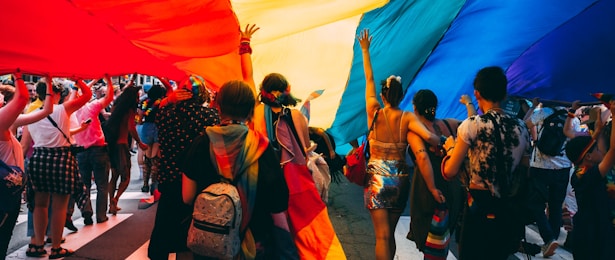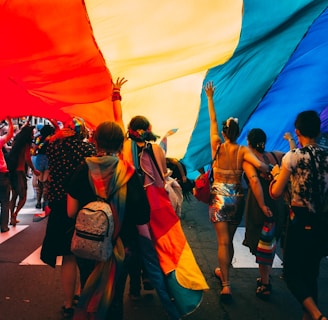How to be a better ally at work
No one is going to ask you to be an ally. For years I found myself caring and learning about the LGBTQ+ community, but not feeling ‘qualified’ enough to do anything about it. But the fact is, there does not come a day when you finally ‘know enough’ or ‘understand enough’ and a rainbow drops down from the sky to anoint you officially an ally. Being an ally is a journey, it’s something you choose to do and be. It is not the responsibility of the LGBTQ+ community to ask you to be one, or tell you the importance of your voice, being an ally is taking responsibility for how you show up for the community. Blog post description.
Tiffany Rose (She/Her)
9/29/20234 min read


Let’s take it back to the basics for minute. What even is an ally? An ally, in this context, is someone who doesn’t identify as a member of the LGBTQ+ community, but who wants to eradicate LGBTQ+ discrimination and inequality. Of course, allies are needed for all minority groups and are not, or at least should not be, mutually exclusive. Being an ally is not a stagnant state, but rather a constantly evolving way of being. The ally continuum is the perfect depiction of the allyship journey, and no matter where you are in that journey, you’re headed in the right direction.
APATHETIC
No understanding of the issues.
AWARE
Knows basic concepts, not active on behalf of self or others.
ACTIVE
Well-informed, sharing and seeking diversity when asked/prompted.
ADVOCATE
Committed, routinely and proactively championing inclusion.
There are, of course, a million ways we can all be better allies and the best way to know how your LGBTQ+ colleagues need support is to ask them. The most important way of being an ally is listening and learning from members of the community themselves and finding ways that you can help. However, that being said, here are some simple things you can do to be an ally in your workplace.
CHECK YOUR PRIVILEGE
As Ice Cube said, ‘check yourself before you wreck yourself’. I choose to believe he was talking about checking your privilege. The conversation around privilege has never been so present or pressing. Privilege refers to the social advantages or benefits experienced by some groups of people over others due to their identity. Different groups can have different privilege in different situations but it’s important to identify where and how you experience privilege in your workplace. Understanding where you are in relation to the problem can help you understand where you are in relation to the solution.
DON’T MAKE ASSUMPTIONS
It’s as simple as it sounds, if you’re talking to someone, particularly someone new to you, don’t assume anything. Start with a blank slate, as you get to know the person better you can fill in the blanks over time. Being a member of the LGBTQ+ community is rarely obvious from a first meeting, and assuming someone is cisgender and heterosexual can lead to some fierce awkward situations. A lot of this can come in the language you use, which leads us to...
WATCH YOUR WORDS
Language is powerful and using the wrong language can make people feel uncomfortable, invalidated or excluded. So perhaps think a little bit more about the specific words or phrases you use. Things like ‘Do you have a boyfriend?’ can put people in an awkward position, saying something like ‘do you have a partner?’ asks the same question, but avoids the awkwardness. Derogatory slurs have long been the enemy of the LGBTQ+ community, so familiarising yourself with the basics of ‘what not to say’ is also crucial. If you’re not sure, as a rule of thumb, err on the side of caution.
Equally, asking people for their pronouns and making sure you use correct pronouns when referring to people is very important. Establishing a pronoun positive culture creates an open space for everyone to be referred to as they choose, breaking down the incorrect assumption that perceived gender is always the correct gender identity. The simple fact is you can’t know how someone identifies unless you ask them, or they feel safe to display their pronouns in some way. Recognising other’s preferred pronouns affirms their gender identity and can play a crucial role in the mental wellbeing of your gender fluid, non-binary and transgender colleagues.
USE YOUR VOICE
There isn’t always going to be an out LGBTQ+ person in the room where decisions are made for your team or department. But that doesn’t mean LGBTQ+ people shouldn’t be considered. Bringing it back to privilege, being listened to in an important room might be one of yours, so you can use your position and privilege to make sure everyone is considered and respected in everything you do at work. It can often be easier for allies to speak up in certain situations than for members of the community themselves as they may not feel safe to do so. There is, however, an important distinction here in making sure you never speak for someone else, sometimes your voice should be used to simply make space for the community.
BE A SAFE SPACE
Being an ally isn’t just about the big global fights, it can often be about being a listening ear for someone on a personal level. It may seem silly, but having a pride sticker on your laptop, or your pronouns in your email signature, can mean a lot. Being a loud ally means that any LGBTQ+ colleagues you have, know they have a safe space in you. And if they experience any discrimination in work, you will care, understand and, if possible, do something about it.
GET UNCOMFORTABLE
No one knows it all, and no one is expected to. So get comfortable having those conversations you’re not particularly comfortable having, and get googling those things you struggle to understand. And if you don’t know, ask. If you are unsure of something and genuinely coming from a place of learning, ask in a kind, respectful way and you won’t offend anyone.
So there you have it, folks, a few tips to hopefully kick start, or add to, your allyship journey. Here’s to making every workplace a more diverse and inclusive one!


